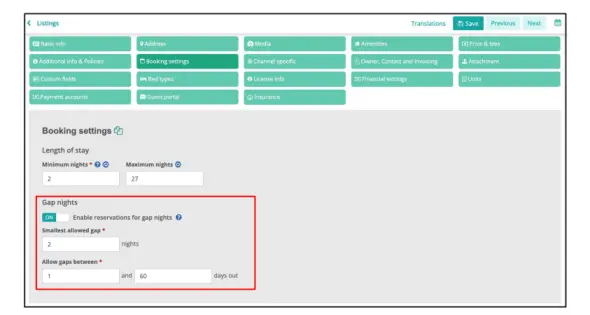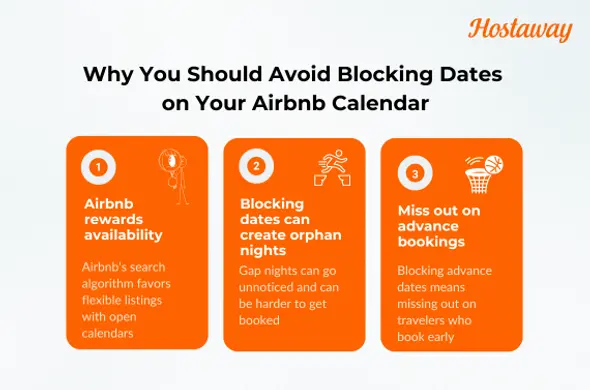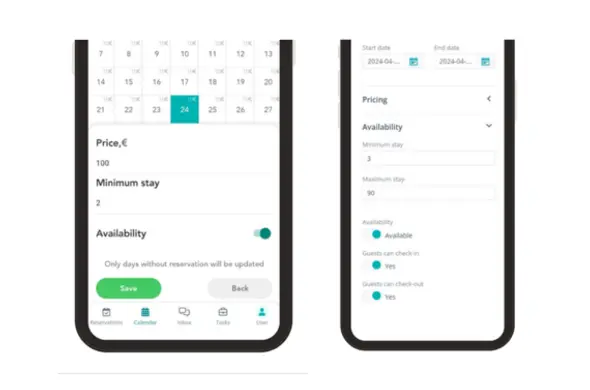How to Block Dates on Airbnb (And Why You Shouldn’t)
.webp?u=https%3A%2F%2Fimages.ctfassets.net%2Fpqmtoyw9z10u%2F3vHet9sTMlQgJ9w96QGJHx%2F4242440145f64b55da75c5d50f7bd0c6%2Fframes-for-your-heart-VnbMyYCCAPg-unsplash__1_.webp&a=w%3D960%26h%3D651%26fm%3Dwebp%26q%3D75&cd=2025-06-23T09%3A52%3A22.190Z)
As a host, managing your Airbnb calendar effectively is one of the most important aspects of running a successful Airbnb property. You might be wondering how to block dates on Airbnb, either to take a break, handle maintenance or avoid overlapping reservations. Blocking nights on your Airbnb calendar is simple but doing it too often can have serious downsides for your bookings, your visibility and even your ranking in Airbnb search.
In this article, we’ll walk you through the process of blocking dates, explain when it makes sense to do so and dive into why Airbnb actually encourages hosts to accept reservations instead of closing off their availability window.
%20(1).webp?u=https%3A%2F%2Fimages.ctfassets.net%2Fpqmtoyw9z10u%2F17HQD2bzpyUzyY2P8PqB6M%2F62f762ab6126a3f16b5d36ec45db891c%2F2025-06_-_Direct_Booking_Guide_2025__1___1_.webp&a=w%3D960%26h%3D84%26fm%3Dwebp%26q%3D75&cd=2025-06-12T21%3A40%3A56.494Z)
How to Block Dates on Airbnb
If you’ve never done it before, here’s how to block dates on Airbnb:
Click Calendar and select the listing
Select the night or nights
Click Blocked to enable
The calendar will now show those dates blocked in grey.
This feature is helpful if you’re preparing the room for maintenance, planning a vacation or need some time off from hosting. You can also unblock them later just as easily.
Reasons for Airbnb Hosts to Block Nights (Sometimes)
There are valid reasons to block nights on your Airbnb calendar. Many hosts do this when:
Performing maintenance or deep cleaning after busy periods
Planning personal use of the property
Needing to mark the calendar for unavailable staff or property manager absences
Taking a short one day off between longer bookings
For Airbnb hosts and property managers managing multiple listings, it can be especially useful to temporarily block dates on their calendar to coordinate service providers, prevent errors or delay last-minute requests.
Why Hosts Shouldn’t Block Nights on their Airbnb Calendar, Often
While blocking nights can be helpful at times, most often it's not the best move, especially if your goal is to increase attract guests, increase bookings and grow your Airbnb business.
1. Airbnb rewards availability
The more nights a listing is available, the more likely it will be compatible with a guest’s plans. That means blocking your Airbnb calendar too aggressively reduces the chances your listing will appear in search results.
You might think it's safer to block nights until you're sure you can host. But Airbnb’s algorithm is designed to surface listings that offer the most flexibility, and that means keeping your calendar as open as possible.
2. You might be creating orphan nights
Another downside? Blocking nights in your calendar can create what's called "gap night," "orphan nights" or “sandwich nights”. These are short gaps between existing reservations that don’t meet your minimum night rule. These — often single or double nights — usually go unbooked unless you manually adjust settings or open them back up.
With Hostaway’s dynamic rule feature, you can implement smart automation that fills in these gaps without having to block nights entirely.

3. You could be missing out on advance bookings
Many guests book far in advance, especially for holiday travel or peak seasons. If your availability window is narrow because you’ve blocked too many days, you may never appear in search for potential guests planning months ahead.
Airbnb listings that allow bookings up to at least 12 months ahead have a better chance of being seen, wishlisted and booked by travelers. Instead of blocking nights, you can simply raise your price temporarily or add prep buffer time. This strategy keeps your calendar visible while still giving you control.
Alternative Options to Blocking Dates for Airbnb Hosts
Still feel unsure about keeping your Airbnb calendar wide open? Here are some other settings available to you:
Adjust minimum stay rules: Shorten them during slower periods to capture gap nights
Set check-in and check-out times judiciously to give yourself a buffer for prep time between guests
Temporarily raise your price instead of blocking dates
Use Hostaway to manage dynamic availability across multiple listings
You don't need to block your entire calendar to maintain control. There are smarter ways to manage booking requests, reservations and availability that don’t sacrifice bookings or visibility.

Why Your Airbnb Calendar Might Be Blocked — Even If You Didn’t Do It
Sometimes, it's Airbnb that is blocking nights in your calendar.
Many hosts don’t realize that blocked dates may be system-generated based on your calendar settings, reservation status or even local regulations. Keeping an eye on this can help ensure your availability window is accurate — and that you’re not missing out on bookings without realizing it.
Here are the main reasons why Airbnb might block your calendar:
1. Availability settings
Airbnb can automatically block nights to comply with your custom settings, such as:
Minimum or maximum night requirements
Advance notice rules
Preparation time between reservations
Specific check-in or check-out restrictions
You can override these on select nights, or adjust the global settings in your calendar dashboard.
2. Synced calendars
If you’ve linked your Airbnb calendar with another calendar, like Google, Airbnb blocks overlapping nights to prevent double booking.
3. Pending or confirmed reservations
Airbnb will block nights automatically when:
A trip request is pending (until you accept, decline or it expires)
A reservation is confirmed
A guest hasn’t completed their payment within 24 hours
You can manually open up some of these dates, but others will remain blocked until the system updates.
4. Cancellations or expired requests
If you cancel a reservation, Airbnb usually keeps those nights blocked. The same applies to expired booking requests. You’ll need to manually reopen those nights if you want them back on the market.
5. Identity or account verification
Airbnb requires all hosts and guests to complete identity verification. If your account lacks key information or hasn’t been verified, your calendar may be frozen, making you unavailable for future bookings. Make sure your Airbnb account is fully up-to-date.
6. Local stay restrictions
In some cities, Airbnb enforces local laws that limit short-term bookings. If your area has a minimum stay requirement — like two nights or more — Airbnb may automatically block shorter stays.
How to Open Up Your Vacation Rental Listing's Availability on Airbnb
If your listing isn’t getting enough bookings, it may not be an issue of demand but of availability. Here are some ways to improve your calendar visibility and ensure you're matching what guests are searching for:
1. Limit blocking dates
The fewer nights you manually block, the more chances you have to accept bookings.
2. Optimize orphan nights
Adjusting your settings to open up gap nights and make your listing appear more often in search, especially for last-minute requests.

3. Accept shorter and longer stays
According to Airbnb, hosts who allow long and short stays earn 45% more. This means adjusting your minimum length of stay requirement to 1-2 nights and setting your maximum length of stay settings to 28 nights and up.
5. Extend your booking window
Airbnb encourages hosts to open their calendar at least 12 months in advance. Doing so increases the chance of being wishlisted, improves your search visibility and captures future travel demand.
6. Loosen check-in and check-out rules
Restrictive check-in or check-out settings (e.g., only allowing arrivals on Fridays) shrink your availability. Removing these constraints makes your calendar compatible with more guest itineraries and improves your chances of getting booked.
Keep Your Calendar Open and Your Bookings Strong
It’s tempting to block dates as a default safety net. After all, you don’t want to double-book, receive requests you can’t handle or disappoint guests with poor service. But Airbnb’s system is designed to reward openness. When you keep your calendar open — especially into the future — you attract more potential guests, more bookings and more consistent revenue.
So yes, learn how to block dates on Airbnb, and use that tool wisely. But don’t rely on it as your go-to method for managing your listing. With an all-in-one vacation rental software like Hostaway, you can offer excellent service without worrying about double bookings, ridiculous price workarounds or unintentional lost income. Your Airbnb vacation rental business will thank you for it.
Ready to find out how Hostaway can transform your business?
